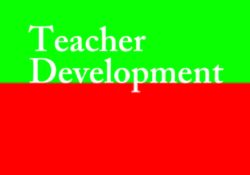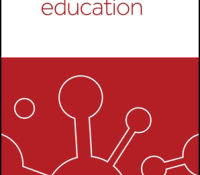tandfonline.com har udgivet en rapport under søgningen “Teacher Education Mathematics”: ABSTRACT ABSTRACT Today teachers and their professional knowledge base have become important, since knowledge has become a pivotal aspect of modern society. This study investigates the shaping of pre-service teachers’ knowledge base by studying the assessment practice in teacher education programmes for primary level teachers. The analytical focus lies on pedagogic discourses and what skills and competencies are legitimized in and through the assessment tasks. The results show that Swedish primary school pre-service teachers are primarily trained to work with subject didactics, and focus is placed on being able to plan, carry out, and evaluate teaching in light of descriptive and normative learning theories, as well as the current curricula. One possible effect of this strong subject didactic focus is… Continue Reading →
Like this:
Like Loading...
eric.ed.gov har udgivet: Growing interest in teaching quality and accountability has focused attention on the need for rigorous studies and evaluations of professional development (PD) programs. However, the study of PD has been hampered by a lack of suitable instruments. The authors present data from the Teacher Knowledge Assessment System (TKAS), which was designed to administer Learning Mathematics for Teaching (LMT) measures. TKAS is being widely adopted in the evaluation of PD programs with over 500 separate program administrations and 16,000 teachers representing every major region in the country. The purpose of the current study was to leverage the TKAS dataset to develop a set of empirical benchmarks of effect sizes for designing rigorous studies of teacher professional development programs. The research design consisted of two goals: (1) to investigate… Continue Reading →
Like this:
Like Loading...
eric.ed.gov har udgivet: Flipped learning is a popular pedagogical approach in K-12 and in higher education (Graziano, 2017), however minimal research exists on the effectiveness of flipped learning in special education teacher preparation courses. Special education teacher candidates enrolled in five sections of a special education math methods course engaged with interactive, flipped “learning lessons” prior to class. During class, they participated in extension activities and lesson planning. The researchers utilized mixed methods to evaluate the impact of performance on and engagement with these learning lessons and found positive predictive relationships with student achievement on all individual summative assignments. Nearly all students agreed flipped learning was useful in helping them meet the course outcomes. Most students specifically credited the flipped lessons as a facilitator of their learning because they allowed… Continue Reading →
Like this:
Like Loading...
tandfonline.com har udgivet en rapport under søgningen “Teacher Education Mathematics”: Abstract Abstract Afterschool interventions in STEM are linked to learning gains during the school day. These opportunities engage and excite students about STEM concepts since they observe a more hands-on, project-oriented approach. Often these opportunities for afterschool interventions are infrequent in nature and leave gaps for students in their maturation and understanding. Herein we describe the first report of an afterschool intervention, named NE STEM 4U, targeting socioeconomically disadvantaged middle school youth via a twice weekly, year-long intervention, studied across two years. We assessed the impact of this program on i.) short-term, individual student gains in STEM content knowledge and ii.) delivery of the program in terms of appropriateness for age group and content using the DoS observation tool. We… Continue Reading →
Like this:
Like Loading...
eric.ed.gov har udgivet: The plethora of data that confronts teachers on a daily basis requires that they know more than simply being able to calculate. It demands that they understand the context in which the mathematical ideas are embedded and what those ideas are telling them in relation to that context. Also, it necessitates that they are prepared to question how data, and the associated claims, are presented. For primary teachers, the implication is that they must be prepared to help their students to develop these skills. The “Finding the Maths” strategy described in this article has been shown to be successful in helping students achieve this outcome. The aim of using this strategy is to encourage students to develop the three types of thinking referred to in the numeracy… Continue Reading →
Like this:
Like Loading...
tandfonline.com har udgivet en rapport under søgningen “Teacher Education Mathematics”: ABSTRACT ABSTRACT This Special Issue aims to present evidence about the relationships between content knowledge (CK), pedagogical knowledge (PK) and pedagogical content knowledge (PCK); the development of these types of knowledge in novice and experienced secondary science teachers; and how CK, PK and/or PCK impact students’ learning. Since Shulman’s introduction of PCK as the feature that distinguishes the teacher from the content expert, researchers have attempted to understand, delineate, assess and/or develop the construct in pre- and in-service teachers. Accordingly, empirical findings are presented that permit further discussion. Outcomes permit post-hoc examination of a recent, collectively described, ‘consensus’ model of PCK, identifying strengths and potential issues. As we will illustrate, the relationship between CK, PK and PCK is central to… Continue Reading →
Like this:
Like Loading...
eric.ed.gov har udgivet: Measures of teachers’ “value added” to student achievement play an increasingly central role in k-12 teacher policy and practice, in part because they have been shown to predict teachers’ long-term impacts on students’ life outcomes. However, little research has examined variation in the long-term effects of teachers with similar value-added performance. In this study, we investigate variation in the persistence of teachers’ value-added effects on student achievement in New York City. We separate persistent effects into general effects that improve both the subject taught (math or English language arts (ELA)) and the other area of measured achievement and subject-specific effects which improve only the subject taught. Two findings emerge. First, a teacher’s value-added to ELA achievement has substantial crossover effects on long-term math performance. That is, having… Continue Reading →
Like this:
Like Loading...
tandfonline.com har udgivet en rapport under søgningen “Teacher Education Mathematics”: ABSTRACT Formulae display:?Mathematical formulae have been encoded as MathML and are displayed in this HTML version using MathJax in order to improve their display. Uncheck the box to turn MathJax off. This feature requires Javascript. Click on a formula to zoom. ABSTRACT The structure and definition of professional knowledge is a continuing focus of science education research. In 2012, a pedagogical content knowledge (PCK) summit was held and it suggested a model of professional knowledge and skill including PCK, which was later often called the Consensus Model (Gess-Newsome, 2015. A model of teacher professional knowledge and skill including PCK: Results of the thinking from the PCK summit. In A. Berry, P. J. Friedrichsen, & J. Loughran (Eds.), Teaching and learning in science series. Re-examining… Continue Reading →
Like this:
Like Loading...
eric.ed.gov har udgivet: Parents, K-8 teachers, and 4th-8th grade children participated as equals in math-focused learning communities through the Math and Parent Partners (MAPPS) program. Pre/post testing and qualitative interviews revealed that the learning communities served as a platform for improvement in mathematical knowledge for teaching of participating teachers. Moreover, teachers learned about parents’ knowledge and strategies, a construct analogous to Knowledge of Content and Students that we describe as “Knowledge of Content and Parents.” [For the complete proceedings, see ED584829.] Link til kilde
Like this:
Like Loading...

tandfonline.com har udgivet en rapport under søgningen “Teacher Education Mathematics”: Abstract Abstract Many educational technology proponents support the Technological Pedagogical Content Knowledge (TPACK) model as a way to conceptualize teaching with technology, but recent TPACK research shows a need for empirical studies regarding the development of this knowledge. This proof-of-concept study applies mixed-methods to investigate the meta-cognitive awareness produced by teachers who participate in the Graphic Assessment of TPACK Instrument (GATI). This process involves creating graphical representations (circles of differing sizes and the degree of their overlap) that represent what teachers understand to be their current and aspired TPACK. This study documented teachers’ explanations during a think-aloud procedure as they created their GATI figures. The in-depth data from two German teachers who participated in the process captured the details of… Continue Reading →
Like this:
Like Loading...




